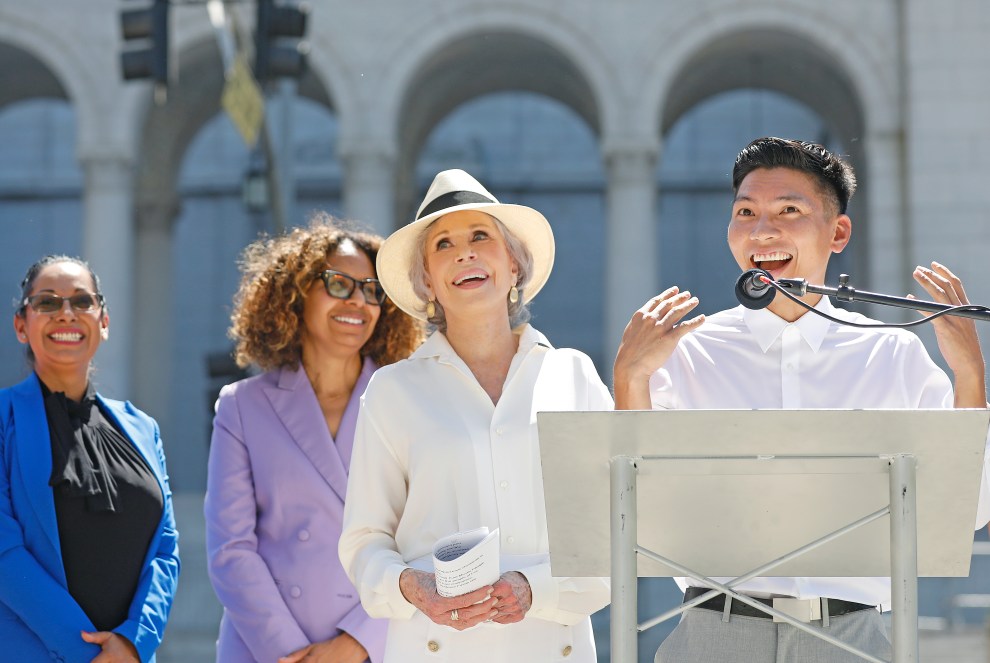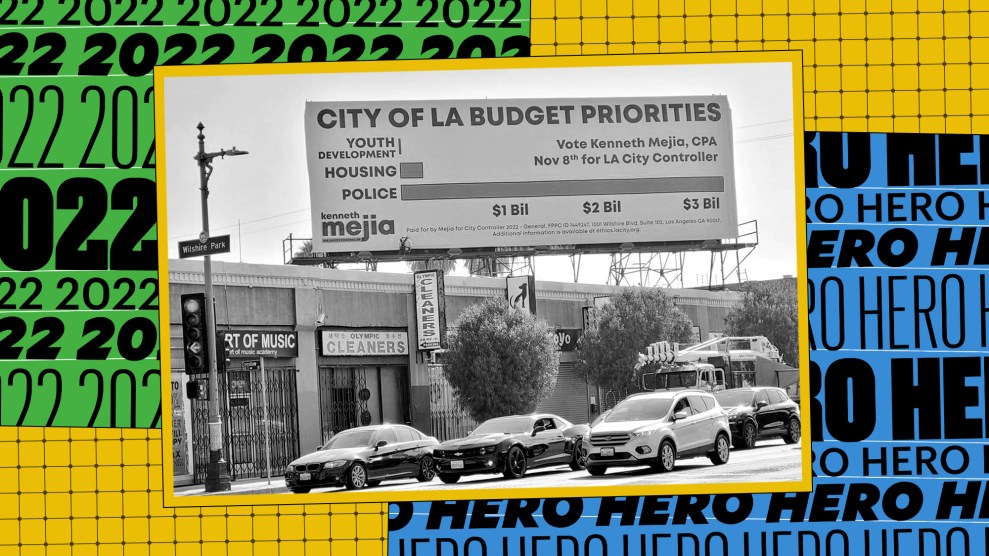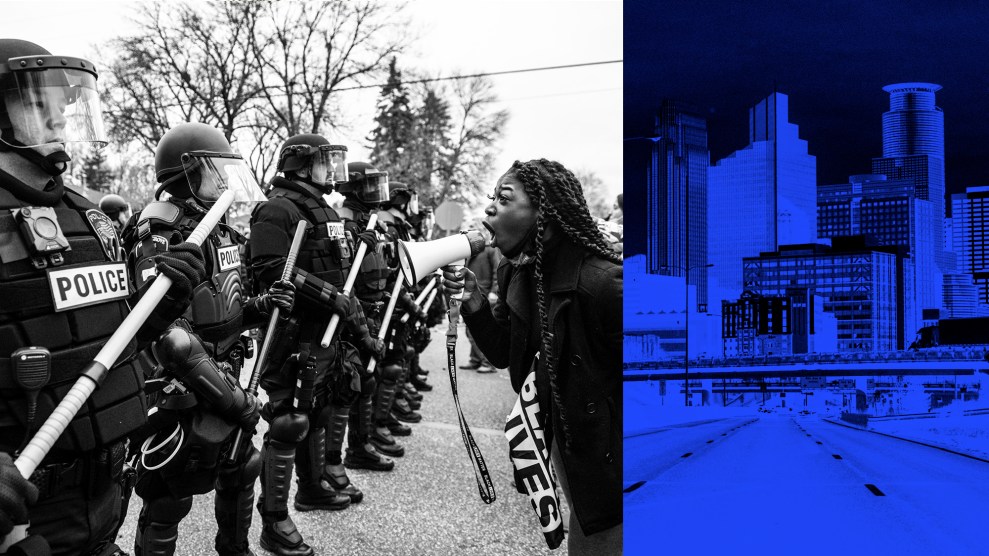One night in late January, Los Angeles’ brand new controller, Kenneth Mejia, zipped up an official windbreaker with a city seal on the left breast, and walked out of City Hall to police headquarters. Mejia, an athletic 32-year-old with a background in left-wing organizing, stood watching at the edge of a vigil to memorialize Tyre Nichols, whose deadly beating by Memphis cops had just been released on video. Officers and cruisers showed up en masse at the gathering, as they would at a series of demonstrations that unfolded over the next several days. Through it all, Mejia and his team did their job: They conducted “on-the-ground” monitoring, keeping eyes on the cops’ expensive show of force.
In November, Mejia, who is Filipino American, won a sweeping victory with a data-based campaign focused on police spending, blasting stats on TikTok and on billboards across the city. The former tenant rights organizer and accountant is now essentially the city’s auditor and paymaster. Mejia doesn’t have the power to reduce the LAPD budget. But he does have the authority to review its finances and performance—and a talent for turning his findings into memes.
Keeping eyes on police at the Nichols protests is an example of how he plans to go about the job. “These things have a lot of big money involved,” Mejia says, smiling broadly in the empty press room where he and his team film TikToks, like his recent announcement of an audit of the city’s recordkeeping and spending on homelessness.
Three years ago, the murder of George Floyd led to widespread calls to defund law enforcement and reallocate money to social programs. While the marches have ended, a drive to follow the money has animated activist campaigns to democratize municipal spending and realign city budgets with community priorities.
Municipal officials like Mejia are tapping into that energy for using city budgeting to make progressive change. Local Progress, a liberal networking group that has organized an informal controllers caucus, counts Mejia and New York City’s Brad Lander as members, along with officials from Albany and Baltimore. (While city controllers aren’t unusual, it is uncommon to, as New York and Los Angeles do, elect them. Many cities have auditors or ombudsmen performing similar functions.)
“Public budgets are moral documents,” says Michelle Wilde Anderson, a municipal finance scholar and Stanford law professor.“We are coming out of a generation of local budgeting around the American poor that wildly, disproportionately favored physical redevelopment and policing.” According to Anderson, “the next generation of public budgeting” will be about “investing in a broader, long-term vision of people’s futures.”
Brad Lander won the NYC comptroller’s race a year and a half ago after pushing to divest at least $1 billion from the NYPD in his role as city council member. During his campaign, he promised to use the office’s oversight powers to fight for “equality, inclusion, and compassion.” On a rainy Tuesday this February, Lander, wearing a gray suit jacket, polka-dot tie, and jeans, presented a budget analysis to a Zoom room of advocacy groups. He adjusted his webcam that sits atop a copy of Robert Caro’s The Power Broker, answering questions about proposed spending for asylum seekers and police overtime—explaining the NYPD’s annual shell game of projecting lower hours while logging many more, which he later derided as a “budget dance.”
Lander, who spent more than a decade on the city council, says progressives used to pay attention to the city’s budget just enough to make sure a new program was funded. Now, in the post-Floyd era, he says they’re more likely to see it as an important space for organizing. Before the summer of 2020, “I don’t think we would’ve done this call,” Lander says, gesturing at his screen.
In February, his office issued its “Wreckless Spending” report, a copy of which sits on his desk, that calculated the city has paid more than $650 million in traffic crash claims over the last decade, with the NYPD responsible for nearly 40 percent—including the largest portion of civilian deaths and life-altering injuries. To incentivize reforms, he recommended that agencies pay for excessive accident settlements out of their own budgets. To Lander, the numbers argue that the cops need to keep their own bad drivers from getting behind the wheel, and should go back to using modestly sized vehicles. “Police vehicles have grown from sedans to SUVs, even though everyone sees that larger vehicles are responsible for more damage in crashes,” Lander says. It’s a prime example, he says, of using wonky budget details to drive change: “We gotta connect the dots between a more inclusive, ambitious, progressive vision and what’s actually in the budget.”
Lander and Mejia have brainstormed, and Lander admires the way his West Coast counterpart has been able to drive a narrative on arcane subjects. “I don’t mind when the youngsters outperform,” jokes Lander. “It’s hard to run for controller and get anybody’s attention…these are really great data visualizations and maps and data tools. What could we do that’s like that?”

LA City Controller Kenneth Mejia during his 2022 campaign.
Christina House/Los Angeles Times/Getty
Growing up in the San Fernando Valley, as Mejia watched his single mom, a nurse, work to provide for him and his three siblings, he came to believe local government should do more to help struggling residents. Still, Mejia was not overtly political. Being good at math, he chose accounting as his college major. After graduating in two and a half years, Mejia got a job at Ernst & Young in 2010, where he paid little attention to the next year’s Occupy movement. But when Bernie Sanders ran for president in 2016, Mejia would listen to his speeches as he pored over client spreadsheets. Sanders’ messages on inequality, housing, and other issues prompted Mejia to take an interest in electoral politics and eventually start organizing with the LA Tenants Union. He launched a write-in campaign for Congress in 2016 and twice ran again on the Green Party line. “I always was proud of running as an outsider,” he says.
Los Angeles’ city elections are technically nonpartisan, and Mejia reasoned that the controller’s office, which dealt with the local issues he organized around, could be a more productive outlet. After Floyd’s killing, People’s Budget LA, a Black Lives Matter–led coalition, surveyed marginalized Angelenos about their tax dollar priorities, pushing to reallocate police funding. “There was a lot of scrutiny already on the budget, and people were getting more politically involved,” Mejia says. “It was the perfect position.”
In a seven-person primary, Mejia found a lane pushing out numbers and eye-catching graphics about city finances. “I was literally digging into budgets and providing convoluted, voluminous data that has like a million rows on an Excel sheet,” Mejia says. “It’s like, no wonder no one cares about this, or knows what’s happening. Because no one—no one—can read this.” The biggest hit was a massive billboard with a chart showing the LAPD’s $3.1 billion budget dwarfing the hundreds of millions spent on housing and homelessness. A picture of the ad went viral, as his campaign churned out TikToks explaining the city budget, featuring Mejia’s corgis and a Pikachu costume. The online antics got attention, but it was the campaign’s research, data visualizations, and public records requests that ultimately earned the Los Angeles Times endorsement—evidence, the paper wrote, that Mejia would “be a creative and incisive controller…serious about making government more transparent, accessible and functional.”
In the summer and fall leading up to the election, as the city council weighed an ordinance prohibiting sitting, lying, or sleeping within 500 feet of schools and day cares, Mejia produced a map showing homeless people would be barred from 20 percent of city sidewalks. At one contentious hearing, Mejia and other protesters were ordered out of City Hall’s council chambers by LAPD officers in riot helmets.
Now he has an office in that same city hall and is prioritizing reviews of the police helicopter fleet and the Los Angeles Homeless Services Authority. On his 100th day in office, his office released a “transparency report” on the city’s scandal-plagued animal services department, analyzing how understaffing and a rise in animal intake was resulting in poor care.
The cops are not fans. After Mejia kept showing up at the Nichols demonstrations, the police union issued a statement saying his presence was “akin to a group of 5th graders auditing…quantum physics being taught at MIT”; a department spokesperson conceded to the Los Angeles Times that Mejia and his team hadn’t gotten in the way, but suggested his tactics were not “the most efficient way to gather hard data.” Meanwhile, Mejia is moving ahead with an official demand for figures detailing the scale and cost of the police response. “We have to let people know, ‘Hey, this is what your tax dollars got,’” he explains. “We’re waiting.”











